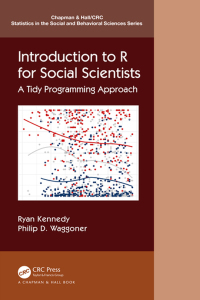Buy Introduction to R for Social Scientists: A Tidy Programming Approach 1st Edition PDF ebook by author Ryan Kennedy; Philip D. Waggoner – published by Chapman & Hall in 2021 and save up to 80% compared to the print version of this textbook. With PDF version of this textbook, not only save you money, you can also highlight, add text, underline add post-it notes, bookmarks to pages, instantly search for the major terms or chapter titles, etc.
You can search our site for other versions of the Introduction to R for Social Scientists: A Tidy Programming Approach 1st Edition PDF ebook. You can also search for others PDF ebooks from publisher Chapman & Hall, as well as from your favorite authors. We have thousands of online textbooks and course materials (mostly in PDF) that you can download immediately after purchase.
Note: e-textBooks do not come with access codes, CDs/DVDs, workbooks, and other supplemental items.
eBook Details:
Full title: Introduction to R for Social Scientists: A Tidy Programming Approach 1st Edition
Edition: 1st
Copyright year: 2021
Publisher: Chapman & Hall
Author: Ryan Kennedy; Philip D. Waggoner
ISBN: 9780367460723, 9781000353877
Format: PDF
Description of Introduction to R for Social Scientists: A Tidy Programming Approach 1st Edition:
Introduction to R for Social Scientists: A Tidy Programming Approach introduces the Tidy approach to programming in R for social science research to help quantitative researchers develop a modern technical toolbox. The Tidy approach is built around consistent syntax, common grammar, and stacked code, which contribute to clear, efficient programming. The authors include hundreds of lines of code to demonstrate a suite of techniques for developing and debugging an efficient social science research workflow. To deepen the dedication to teaching Tidy best practices for conducting social science research in R, the authors include numerous examples using real world data including the American National Election Study and the World Indicators Data. While no prior experience in R is assumed, readers are expected to be acquainted with common social science research designs and terminology. Whether used as a reference manual or read from cover to cover, readers will be equipped with a deeper understanding of R and the Tidyverse, as well as a framework for how best to leverage these powerful tools to write tidy, efficient code for solving problems. To this end, the authors provide many suggestions for additional readings and tools to build on the concepts covered. They use all covered techniques in their own work as scholars and practitioners.





